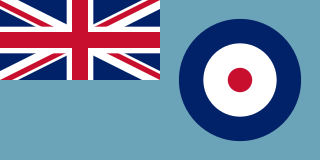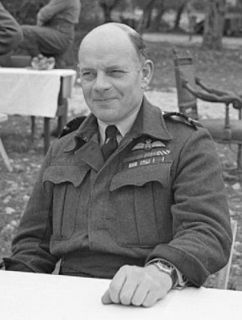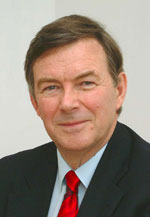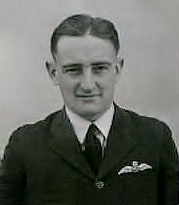
Marshal of the Royal Air Force (MRAF) is the highest rank in the British Royal Air Force (RAF). In peacetime it was granted to RAF officers in the appointment of Chief of the Defence Staff (CDS), and to retired Chiefs of the Air Staff (CAS), who were promoted to it on their last day of service. While surviving marshals of the RAF retain the rank for life, the highest rank to which officers on active service are promoted is now air chief marshal. Although general promotions to Marshal of the Royal Air Force have been discontinued since the British defence cuts of the 1990s, further promotions to the rank may still be made in wartime, for members of the Royal Family and certain very senior RAF air officers in peacetime at the discretion of the monarch; all such promotions in peacetime are only honorary, however. In 2012, Charles, Prince of Wales was promoted to the rank while in 2014 Lord Stirrup, who had served as Chief of the Air Staff and Chief of the Defence Staff for over seven years, was also promoted.
Air vice-marshal (AVM) is a two-star air officer rank which originated in and continues to be used by the Royal Air Force. The rank is also used by the air forces of many countries which have historical British influence and it is sometimes used as the English translation of an equivalent rank in countries which have a non-English air force-specific rank structure. Air vice-marshals may be addressed generically as "air marshal".

The Chief of the Air Staff (CAS) is the professional head of the Royal Air Force and a member of both the Chiefs of Staff Committee and the Air Force Board. The post was created in 1918 with Major General Sir Hugh Trenchard as the first incumbent. The current and 29th Chief of the Air Staff is Air Chief Marshal Sir Stephen Hillier, who succeeded Sir Andrew Pulford in July 2016.
Marshal of the Royal Air Force Sir Peter Robin Harding, is a retired Royal Air Force officer who served as a bomber pilot in the 1950s, a helicopter squadron commander in the 1960s and a station commander in the 1970s. He became Chief of the Air Staff in 1988 and served in that role during the Gulf War in 1991. He became Chief of the Defence Staff in December 1992 but resigned after his affair with Lady (Bienvenida) Buck, the wife of Conservative MP Antony Buck, became public.

Marshal of the Royal Air Force Sir William Forster Dickson, was a Royal Naval Air Service aviator during the First World War, a senior officer in the Royal Air Force during the inter-war years and a Royal Air Force commander during and after the Second World War. Dickson was Chief of the Air Staff in the mid-1950s, in which role his main preoccupation was the establishment of the V Force and the necessary supporting weapons, airfields and personnel. He also served as the first Chief of the Defence Staff in the late 1950s.

Air Marshal Timothy Garden, Baron Garden, FRUSI, FCGI was a senior commander in the Royal Air Force (RAF) who later became a university professor and a Liberal Democrat politician.

Chief of Air Force (CAF) is the most senior appointment in the Royal Australian Air Force (RAAF), responsible to the Chief of the Defence Force (CDF) and the Secretary of the Department of Defence. The rank associated with the position is air marshal (three-star). The role encompasses "the delivery of aerospace capability, enhancing the Air Force's reputation and positioning the Air Force for the future". It does not include direction of air operations, which is the purview of the Air Commander Australia, a two-star position responsible directly to CDF in such circumstances but nominally reporting to CAF.

Air Vice Marshal Meredith Thomas, was a senior commander in the Royal Air Force during the Second World War. He began his career as a flying ace during the First World War, credited with five aerial victories.
Air Chief Marshal Om Prakash Mehra was Chief of the Air Staff of the Indian Air Force from 1973 to 1976. He received Param Vishisht Seva Medal (PVSM), the highest military award for peace-time service, in 1968. He was awarded Padma Vibhushan, India's second highest civilian honour, in 1977. He later became Governor of Maharashtra from 1980 to 1982, and Governor of Rajasthan from 1985 to 1987. He married Satya Mehra and has four children with her Sunil, Parveen, Rahul, and Amitava and numerous grand children.

Air Vice-Marshal William Hopton (Bill) Anderson, CBE, DFC was a senior commander in the Royal Australian Air Force (RAAF). He flew with the Australian Flying Corps in World War I, earning the Distinguished Flying Cross and the Belgian Croix de guerre, and leading Nos. 3 and 7 Squadrons. Anderson commanded the Australian Air Corps during its brief existence in 1920–21, before joining the fledgling RAAF. The service's third most senior officer, he primarily held posts on the Australian Air Board in the inter-war years. He was appointed a Commander of the Order of the British Empire in 1934, and promoted to air commodore in 1938.

Air Vice Marshal Henry Neilson Wrigley, CBE, DFC, AFC was a senior commander in the Royal Australian Air Force (RAAF). A pioneering flyer and aviation scholar, he piloted the first trans-Australia flight from Melbourne to Darwin in 1919, and afterwards laid the groundwork for the RAAF's air power doctrine. During World War I, Wrigley joined the Australian Flying Corps and saw combat with No. 3 Squadron on the Western Front, earning the Distinguished Flying Cross; he later commanded the unit and published a history of its wartime exploits. He was awarded the Air Force Cross for his 1919 cross-country flight.
Air Vice Marshal George Arthur Chesworth was a senior Royal Air Force officer and Lord Lieutenant of Moray.

Air Vice Marshal Ellis Charles Wackett, CB, CBE was a senior commander in the Royal Australian Air Force (RAAF). Its chief engineer from 1935 to 1959, he served on the RAAF's controlling body, the Air Board, for a record seventeen years, and has been credited with infusing operations with new standards of airworthiness. Commencing his service career as a Royal Australian Navy cadet during World War I, Wackett transferred to the Air Force in 1923 while on an engineering course in Britain. He qualified as a pilot before completing his studies and returning to Australia, where he inaugurated parachute instruction within the RAAF and made the country's first freefall descent from a military aircraft in 1926. The following year, he led a three-month survey flight to Papua New Guinea.
Air Marshal Raymond George (Ray) Funnell, is a retired senior commander of the Royal Australian Air Force (RAAF). He served as Chief of the Air Staff (CAS) from 1987 until 1992. A graduate of RAAF College, he began his career flying CAC Sabre jet fighters in Australia and South East Asia in the 1950s and 1960s. From 1972 to 1975 he commanded No. 6 Squadron, during which time the General Dynamics F-111C swing-wing bomber entered Australian service. He held senior staff posts in the early 1980s. In 1986, he was promoted to air marshal and became the inaugural Vice Chief of the Defence Force. Appointed CAS in July 1987, Funnell was closely involved in the development and dissemination of air power doctrine. He retired from the RAAF in October 1992 following his term as CAS, and was founding Principal of the Australian College of Defence and Strategic Studies from 1994 to 1998. Since then he has served on various Federal Government committees on immigration and detention.

Air Vice Marshal Ian Dougald McLachlan, CB, CBE, DFC was a senior commander in the Royal Australian Air Force (RAAF). Born in Melbourne, he was a cadet at the Royal Military College, Duntroon, before joining the Air Force in December 1930. After serving in instructional and general flying roles, he took command of No. 3 Squadron in December 1939, leading it into action in the Middle East less than a year later. Awarded the Distinguished Flying Cross, he returned to Australia in 1942 to command air bases in Canberra and Melbourne. The following year he was posted to the South West Pacific, where he led successively Nos. 71 and 73 Wings. Having been promoted to group captain, he took charge of Southern Area Command in 1944, and No. 81 Wing in the Dutch East Indies the following year.
Air Chief Marshal Sir Roger Hewlett Palin, is a former senior Royal Air Force commander.
Air Marshal Sir Kevin James Leeson, is a retired Royal Air Force engineer officer, whose final appointment was as Chief of Materiel – Air at the Defence Equipment and Support organisation, concurrently holding the appointments of Air Member for Materiel on the Air Force Board and Chief Engineer (RAF), at which point he was the most senior non-aircrew officer in the service.

Air Vice Marshal Frank Headlam, was a senior commander in the Royal Australian Air Force (RAAF). Born and educated in Tasmania, he joined the RAAF as an air cadet in January 1934. He specialised in flying instruction and navigation before the outbreak of World War II. In April 1941, he became commanding officer of No. 2 Squadron, which operated Lockheed Hudsons. The squadron was deployed to Dutch Timor in December, and saw action against Japanese forces in the South West Pacific. After returning to Australia in February 1942, Headlam held staff appointments and training commands, finishing the war a group captain.

Air Vice Marshal Frederick "Freddie" Charles Hurrell, was a senior medical officer in the Royal Air Force who spent his 35-year military career in aviation medicine and served as Director-General of the RAF Medical Services from 1986 to 1988.
Air Vice Marshal Garry Tunnicliffe is a senior Royal Air Force officer who serves as Defence Services Secretary.
















